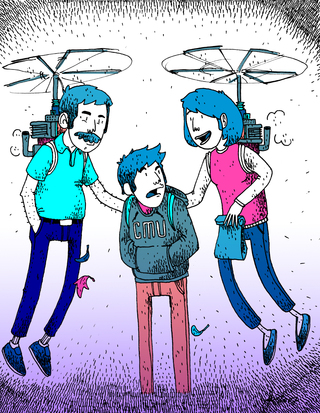3 Signs You Are A Helicopter Parent
Are you protective of your children? Perhaps even a helicopter parent? Children need a parent to protect and guide them, no doubt. They need parents  who will teach them right from wrong and hold them accountable to those standards. They benefit from parents that will support them and advocate for them when necessary. However, in our child-centered culture, some parents have become what many lovingly refer to as “the helicopter parent.” You know who they are…perhaps you have even played the role of a helicopter parent yourself. Unfortunately, playing the helicopter parent carries a cost for you and your children. So, are you a helicopter parent? If so, what are the costs of hovering over our children?
who will teach them right from wrong and hold them accountable to those standards. They benefit from parents that will support them and advocate for them when necessary. However, in our child-centered culture, some parents have become what many lovingly refer to as “the helicopter parent.” You know who they are…perhaps you have even played the role of a helicopter parent yourself. Unfortunately, playing the helicopter parent carries a cost for you and your children. So, are you a helicopter parent? If so, what are the costs of hovering over our children?
 who will teach them right from wrong and hold them accountable to those standards. They benefit from parents that will support them and advocate for them when necessary. However, in our child-centered culture, some parents have become what many lovingly refer to as “the helicopter parent.” You know who they are…perhaps you have even played the role of a helicopter parent yourself. Unfortunately, playing the helicopter parent carries a cost for you and your children. So, are you a helicopter parent? If so, what are the costs of hovering over our children?
who will teach them right from wrong and hold them accountable to those standards. They benefit from parents that will support them and advocate for them when necessary. However, in our child-centered culture, some parents have become what many lovingly refer to as “the helicopter parent.” You know who they are…perhaps you have even played the role of a helicopter parent yourself. Unfortunately, playing the helicopter parent carries a cost for you and your children. So, are you a helicopter parent? If so, what are the costs of hovering over our children? · If you are a helicopter parent, you may find yourself structuring your children’s every waking moment. You may include yourself in their every activity. You will look for reasons to talk with them every waking moment. If they have sport’s practice or music practice, you are there to watch and encourage…every time. If they attend youth groups, you become the sponsor. If they go on a school trip, you become one of the adult chaperones. A helicopter parent’s life revolves around their children and their children’s activities. Where there child goes, the helicopter parent is sure to hover near.
o Children benefit from time in which they have nothing to do but play with other children—that means unstructured, unsupervised, no adults involved, creative fun. Given time for this type of play, children develop creative problem-solving skills, resilience, confidence, and the ability to manage their own time. With time away from parents, children grow more independent. They learn how to accept the support and assistance of other trustworthy adults. They build their own support group. They become better decision-makers. Interestingly, children who are provided opportunities to engage in unsupervised play even become more active than those children constantly supervised.
· If you are a helicopter parent, you may find yourself “stepping in” to save your children from any struggle or potential disappointment. Helicopter parents, not wanting their children to make any mistakes or get a single problem wrong, step in to cajole, explain, and even make corrections saving their children from “suffering” the disappointment of a less than perfect homework assignment. If their children forget an assignment, the helicopter parent dutifully rushes it to the school. If their children begin to experience discomfort with some task, the helicopter parent swoops in to ease the pain and complete the task. No failure allowed…they reason, “It might hinder my children’s self-esteem.”
o Children benefit from some struggle, disappointment, and even failure. They learn how to “bounce back.” They discover their own  strengths and weaknesses. They learn that momentary failure or disappointment is not the end of the world, but an opportunity to learn, grow, and persist. This leads to greater resilience and strength, persistence and fortitude. A little failure never hurt anyone…some might even say that learning to manage setbacks actually “makes the man.” Like Einstein, Edison, or Lincoln, a child who experiences momentary setbacks can achieve more than their peers who were rescued from setbacks and, as a result, never learned to persist.
strengths and weaknesses. They learn that momentary failure or disappointment is not the end of the world, but an opportunity to learn, grow, and persist. This leads to greater resilience and strength, persistence and fortitude. A little failure never hurt anyone…some might even say that learning to manage setbacks actually “makes the man.” Like Einstein, Edison, or Lincoln, a child who experiences momentary setbacks can achieve more than their peers who were rescued from setbacks and, as a result, never learned to persist.
 strengths and weaknesses. They learn that momentary failure or disappointment is not the end of the world, but an opportunity to learn, grow, and persist. This leads to greater resilience and strength, persistence and fortitude. A little failure never hurt anyone…some might even say that learning to manage setbacks actually “makes the man.” Like Einstein, Edison, or Lincoln, a child who experiences momentary setbacks can achieve more than their peers who were rescued from setbacks and, as a result, never learned to persist.
strengths and weaknesses. They learn that momentary failure or disappointment is not the end of the world, but an opportunity to learn, grow, and persist. This leads to greater resilience and strength, persistence and fortitude. A little failure never hurt anyone…some might even say that learning to manage setbacks actually “makes the man.” Like Einstein, Edison, or Lincoln, a child who experiences momentary setbacks can achieve more than their peers who were rescued from setbacks and, as a result, never learned to persist. · If you are a helicopter parent, you may want to be your child’s BFF (Best Friend Forever). Unfortunately, helicopter parents as BFF’s are governed and constrained by fear. They fear that a child’s anger will mean the friendship is broken…so they give in or argue. They try to convince their child to engage in certain behaviors, but fear to push too much and “threaten” the BFF relationship. To compensate, helicopter parents may praise their child incessantly, raving about any success, large or small. Parental BFF’s find themselves subservient to their children’s emotions.
o Children benefit from a BFF…but that BFF is not their parent. Children need a parent who they can “look up to” rather than see as an equal. They benefit from a parent who presents a loving, but strong authority figure they can respect…a loving authority that even produces a healthy fear of doing the wrong thing and receiving the “just penalty” for that action, whether that be a disappointed look or some stronger consequence. Of course, that relationship changes as our child grows. However, even as adult children, we respect and submit to our parent’s will out of a respect that was nurtured and taught during childhood.
Are you a helicopter parent? If you are, I’m sure you are acting out of love for your child. Take a moment to consider the truth that setting the helicopter down and parenting from a different perspective actually reveals your love in a deeper and more enduring manner. I invite you to steer over to the landing pad and park the helicopter. Pick up a few shepherding tools and begin to lead your child with the parental authority that will guide them into healthy adulthood.